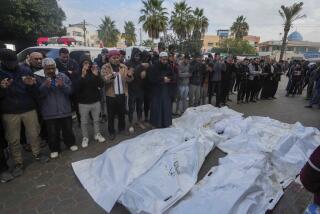Bush, Merkel United on Iran
President Bush and German Chancellor Angela Merkel, in their first meeting since her election, presented a united front Friday against an Iranian nuclear program that Bush called “a grave threat to the security of the world.”
Their joint White House news conference carried important political symbolism, indicating growing U.S.-European cooperation on the question of Iran’s nuclear intentions on a day that saw Tehran issue new threats in the face of international condemnation.
Bush praised Germany’s cooperation but insisted that it was not yet time to talk about sanctions against Iran, a step that could reopen divisions between Washington and Berlin. Of the three European countries involved in negotiations with Tehran, Germany has been the least enthusiastic about joining the United States in pressuring Iran.
“I’m not going to prejudge what the United Nations Security Council should do,” Bush said.
A day earlier, officials of Germany, France and Britain said their two-year negotiations with Iran had reached a dead end, and they called for the issue to be sent to the Security Council for possible action.
Iran angered the European group earlier this week by breaking the U.N. seals on uranium enrichment equipment and declaring that the country would resume nuclear research.
In a further step, Iran’s foreign minister warned Friday that if the issue did go to the Security Council, Iran would stop working with U.N. inspectors monitoring the country’s nuclear activities. Manuchehr Mottaki said that a referral would have “consequences” for the West and that, in keeping with Iranian law, Tehran would have to halt its voluntary cooperation with inspectors.
Experts spent the day assessing the effect of the latest developments. Iran has signed but not ratified an international agreement that allows snap U.N. inspections of Iranian facilities. If Iran halts such voluntary cooperation, it will not be violating the Nuclear Nonproliferation Treaty, but it will be doing only the minimum to satisfy the treaty’s provisions.
Iran has insisted it is merely asserting its legal right to develop a civilian nuclear energy program.
U.S. officials and Europeans suspect the country’s leaders want to one day acquire weapons.
Bush said the United States and other Western nations had “made it abundantly clear to the Iranians that the development of the know-how and/or a nuclear weapon was unacceptable, because Iran armed with a nuclear weapon poses a grave threat to the security of the world.”
When Iran notified the International Atomic Energy Agency, the U.N. nuclear watchdog, that it would resume nuclear research and development at its facility at Natanz, the United Nations anticipated maintenance work. But in a private letter to the agency, Tehran said it intended to move toward building a centrifuge plant to enrich uranium, a step needed to produce either fuel for power plants or material for a nuclear warhead.
Like Bush, Merkel, who took office Nov. 22, avoided detailing specific steps the U.N. might take against Iran.
She said she viewed recent discussions on Iran as a “very successful chapter” in U.S.-German relations.
Ray Takeyh, a specialist on Iran at the Council on Foreign Relations, said the joint statement was significant because it showed that “the wobbliest of the three European countries, the one with the most Iranian investments, has turned on the Iranians.”
“So we see an American-European solidarity that the Iranians could not erode, though they’ve been trying to during 2 1/2 years of negotiations,” Takeyh said.
The threat to cut off voluntary inspections should not technically be read as a move by Tehran to abandon treaty obligations, Takeyh said.
But in the current political environment, in which many countries are frustrated with Iran, “any sort of retreat from the voluntary obligations they took on ... are likely to be seen as an egregious violation of their nonproliferation commitments,” he said.
Gary Milhollin, director of the Wisconsin Project on Nuclear Arms Control in Washington, said Iran’s threat to end voluntary inspections actually may be an encouraging sign.
“It means they still expect to negotiate,” he said. “If they wanted to rupture relations with the rest of the world, they would have threatened more than that. In 18 years of noncompliance, this is pretty minor.”
Iran freely agreed to the inspections to support its claim that its nuclear program was meant to produce peaceful energy, not weapons.
Iran appeared to have been the main subject of the lengthy private meeting between Bush and Merkel.
Merkel said later that Germans abhorred as “totally unacceptable” statements by Iranian President Mahmoud Ahmadinejad questioning Israel’s right to exist and describing the Holocaust as a myth.
On another issue, Bush and Merkel did not conceal their differences over the indefinite detention of suspected terrorists at the U.S.-run prison at Guantanamo Bay, Cuba, which Merkel has said she would like to see closed.
Bush said he believed that differences over the base arise because of misperceptions. He said he too would like to see “a way forward” on the prison, and suggested that it could come through trials of the detainees by military tribunals. The constitutionality of the tribunal system proposed by Bush has been challenged in federal court.
Bush insisted, “Guantanamo is a necessary part of protecting the American people. So long as the war on terror goes on, we will need to hold people” who would harm Americans.
After his private talk with Merkel, Bush said, “She’s smart. She’s plenty capable. She’s got the kind of spirit to her that is appealing. She loves freedom.”
Bush had a strained relationship with former Chancellor Gerhard Schroeder, especially over the Iraq war, and the White House has been eager for better ties with the 51-year-old Merkel, who was born in what was East Germany.
Many analysts say they don’t expect many policy changes in U.S.-German relations, in part because cooperation between the countries is already good in many areas.
They say there may be a significant improvement in mood and tone between the president and the new chancellor, who are closer in ideology than were Bush and Schroeder.
*
(BEGIN TEXT OF INFOBOX)
Run-up to referral
When Iran broke the U.N. seals at its Natanz uranium enrichment plant this week, it reopened a long-running conflict with the West over its nuclear activities.
2003
February-May: U.N.’s International Atomic Energy Agency examines nuclear sites.
June: IAEA says Iran kept certain nuclear activities secret.
November: IAEA says Iran acknowledged that it produced weapons-grade uranium; no evidence found.
2004
February: Pakistani scientist admits giving nuclear weapons technology to Iran.
June: IAEA presses Iran to clarify the aims of its nuclear program.
September: Secretary of State Colin L. Powell calls for international sanctions.
November: Iran announces suspension of uranium enrichment efforts.
2005
August: Iran announces resumption of efforts; IAEA calls emergency meeting.
Sept. 17: Iran tells U.N. it has an “inalienable right” to produce nuclear fuel, rejects European offer of incentives.
Sept. 24: IAEA resolution calls Iran’s program “illegal and illogical.”
Nov. 11: Plans emerge for Russia to enrich uranium for Iran on its soil.
Nov. 24: EU warns of possible referral to U.N. Security Council.
2006
Jan. 10: Iran removes U.N. seals at Natanz facility.
Jan. 12: Europeans accuse Iran of deception.
Jan. 13: Iran vows to block inspections if case goes to Security Council.
Source: Associated Press
*
Times staff writer Tyler Marshall contributed to this report.
More to Read
Start your day right
Sign up for Essential California for news, features and recommendations from the L.A. Times and beyond in your inbox six days a week.
You may occasionally receive promotional content from the Los Angeles Times.







